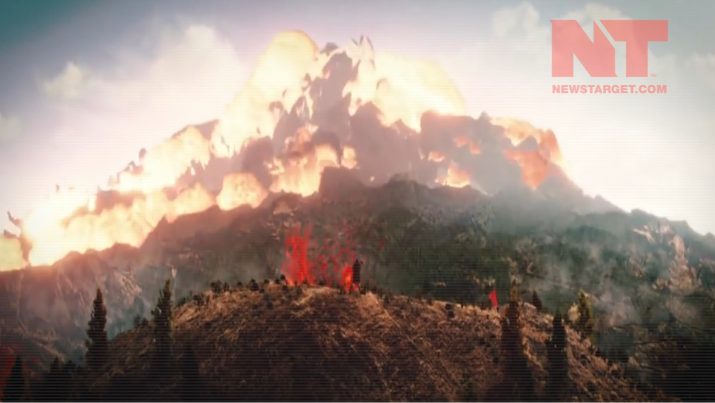
Yellowstone Volcano will not erupt soon, according to latest USGS report
Tuesday, August 10, 2021 by Mary Villareal
http://www.naturalnewsreports.com/2021-08-10-yellowstone-volcano-will-not-erupt-soon-usgs.html

Is the Yellowstone Volcano due for another supereruption?
Geologists assure everyone that the volcano will not be erupting violently anytime soon. But because the volcano erupts every 600,000 to 700,000 years on average, many believe that it is overdue for another one.
The latest reports from the United States Geological Survey (USGS) have done little to dull the people’s concerns, as it has confirmed 1,008 earthquakes in the park in July 2021 alone, all of which were recorded by the Yellowstone Seismic Network.
The Yellowstone volcano experienced over 1,000 earthquakes in July alone, making this a record high that the USGS said will likely increase over the next few months.
Due to the period of intense seismic activity, the USGS published monthly reports about Yellowstone National Park and volcano, stretching across a section of the Western United States. The supervolcano is one of the country’s most seismically active regions and the site of three cataclysmic eruptions, the last of which was 640,000 years ago.
These eruptions covered vast areas of the U.S. in a layer of volcanic ash that — if another eruption would happen today — could disrupt climate patterns and affect global food production.
The USGS also noted that the number of earthquakes will likely increase in a preliminary analysis, and geologists expect dozens of smaller earthquakes following an intense period of activity on July 16.
“This is the most earthquakes in a month since June 2017, when over 1,100 earthquakes were located,” the USGS said. The strongest earthquake recorded in July was a minor event locking in at magnitude 3.6, 11 miles under Yellowstone lake.
This period of seismic activity marked the beginning of hundreds of smaller earthquakes, with 764 tremors detected under the lake. 40 quakes were also detected about 12 miles east-northeast of West Yellowstone in Montana on July 19.
Despite the number of seismic activities, none of these show signs of impending doom. Earthquakes are generally triggered by the movement of fault lines and geothermal processes, not the movement of magma.
The USGS further stated, “If magmatic activity were the cause of the quakes, we would expect to see other indicators, like changes in deformation style or thermal/gas emissions, but no such variations were detected.”
Is Yellowstone overdue for an eruption?
Volcanoes do not work in predictable ways, so their eruptions don’t follow predictable schedules. Volcanic systems with supereruptions don’t necessarily have them multiple times; however, if they occur more than once, they are not evenly timed.
Another catastrophic eruption at Yellowstone remains possible; however, scientists are not convinced that it will happen, with the magma chamber beneath at only 5 to 15 percent molten. The rest of the magma is solidified but hot, so it is unclear whether or not there is enough magma beneath the Yellowstone’s caldera to feed another eruption.
As for the earthquakes at Yellowstone, most of them are brittle events caused when rocks break because of stresses in the Earth’s crust. Nobody has yet identified the long-period events commonly attributed to the magma movement. Even if these movements are observed, it still does not mean Yellowstone is ready to erupt. (Related: Emergency preparedness: How to prepare for the Yellowstone Caldera eruption.)
People live in fear of another Yellowstone eruption
People still believe that the U.S. will one day be blindsided by a supereruption at Yellowstone.
One Twitter user said: “I’ll just say that when I went to Yellowstone 15 years ago, I was freaked out the entire time. Sleeping among free-roaming animals and on top of a super-volcano that’s overdue for an eruption definitely made me nervous.”
There is no reason to believe that Yellowstone will have another massive blast anytime soon. The USGS noted: “Yellowstone is not overdue – that’s one of the more common misconceptions. First, volcanoes don’t work like that. Second, even if they did, we would still have about 100,000 years to go for a Yellowstone explosion.”
Learn more about how earthquakes and volcanoes work at Ecology.news.
Sources include:
RECENT ARTICLES


Four FBI agents found to have paid PROSTITUTES while on overseas duty
By Ramon Tomey

Russia threatens to deploy intermediate-range nuclear missiles in Europe as tension with US escalates

Medical martial law: Military taking over hospitals in FOUR states after thousands of nurses were fired for having natural immunity and refusing spike protein injections
By Ethan Huff

Hospitals are retracting their COVID-19 vaccine mandates due to federal court rulings and labor shortages
COPYRIGHT © 2017 NATURAL NEWS REPORTS


